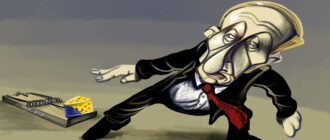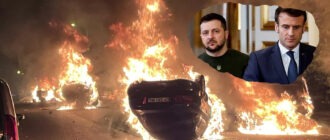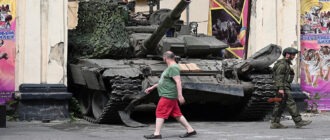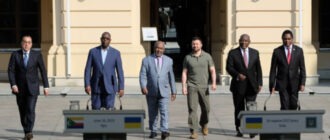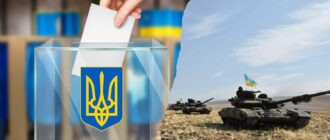Gagauzia could be the source of World War III
The First World War began in Serbia — the deadest corner of Europe at the time — and was launched by a man with the funny name of Gavrilo Princip. Much water has flown under the bridge since then. World War I was followed by rumbling World War II and then by the long Cold War. Then NATO armies carpet-bombed Serbia, but in the end it became not the most backward backwater on the continent, and new, more dusty and backwater countries were formed in the eastern outskirts of the Balkans. And in addition to countries, there are regions which aspire to become countries, and which even have a certain sovereignty. Like Kosovo, or Crimea in their day.
In Gagauzia, for instance, they elected the bashkan, — that’s what they call the head of the republic. I don’t want to sound prejudiced, but to my ear the word «bashkan» sounds almost as absurd as the name Gavrilo Princip. And Gagauzia would give Serbia a head start even at the beginning of the last century — a poor region of a poor country, and at the time of Yanukovych the poorest in Europe. It doesn’t even fully understand itself as a country, and its nationalism is not about sovereignty, but about absorption by Romania. Well, it is nationalism, but the Romanian one.
And this Romanian direction has long been a stumbling block in relations between Chisinau and Comrat (the capital of the republic, where the Bashkan’s office is located). Gagauzians are categorically against integration, as they are, heart and soul, as well as investment wise, not with the EU, but with Russia and Turkey. In particular, in 2014, the republic held a referendum on the choice of geopolitical vector, with 98% of participants opting to join the Customs Union of Russia, Belarus and Kazakhstan. In October 2022, when the military situation in the south of Ukraine was still fluid, the Congress of Deputies of all levels of the Gagauz Republic appealed to the governments of Russia and Turkey to prevent the occupation of the republic by the Romanian military if the Odessa region was invaded by the Russian army.
All this was back under the previous Bashkan, Natalia Vlakh, who had already threatened Chisinau with secession in the event of a merger of Moldova with Romania. With the new one, it’s even worse. Eugenia Gutsul also represents the Shor Party, an opposition force named after businessman and politician Ilan Shor, who has been accused of embezzling a billion dollars from the state treasury, though he has not been prosecuted for it, so the popular rumours may be misleading. Be that as it may, the authorities have more serious grievances against the Shor party. The Moldovan parliament recently debated banning members of the Shor party from speaking from the podium, and there have been proposals to the Supreme Court to ban the party as an agent of the Kremlin. The fact is that from the rostrum of parliament the party’s representatives accused the authorities of preparing a military operation to retake Transnistria, and even that in cooperation with Ukraine. That is, they accused President Sandu of trying to drag the country into a Ukrainian military conflict. The war, however, did not take place. But the Shor Party has begun to be banned.
In any case, entrenching the Shor party, which official Chisinau considers the most pro-Russian as the power in the autonomy, is not at all what Maia Sandu and her comrades would have wanted. And now, at the end of the elections in Gagauzia, the OMON from Chisinau seizes the Central Electoral Commission in Comrat, carries out searches, takes voter lists to the capital, and political circles, as the main scenario, point to the non-recognition of the results of the elections by Chisinau. Meanwhile, the People’s Assembly of Gagauzia held an emergency meeting, at which Eugenia Gutsul was declared bashkan, without waiting for a decision from Chisinau. And a congress of deputies at all levels is scheduled for 27 May. And we know from the events of 2014 what regional congresses of deputies at all levels can lead to. Participants in the seizures of regional administrations in Donetsk and Luhansk based their actions on the decisions of a similar congress, which declared the events on Maidan a coup d’état. And while the Shor party is preparing mass protests in major Moldovan cities in parallel to the events in Comrat, supporters of the breakaway from Romania are preparing their march.
Of course, all this could have somehow dissipated — after all, the Russian army never reached the Moldovan borders and is unlikely to do so — but there is a third, Turkish side to the whole story. Turkey has already invested in the Turkic brothers of the Gagauz, building them land reclamation systems and irrigating millions of hectares. Turkish business intends to invest another 2 billion in the region in 2023 — building a plant to process grain into flour and feed pellets. And these are by no means all projects. The most important of them is the Giurgiulesti International Free Port, located on the Danube estuary, 133 km from the Black Sea. The only port in Moldova capable of handling Black Sea vessels, specialising in grain shipment, which in the context of the Ukrainian grain deal is a goldmine.
And now, against the backdrop of the Turkish elections and the upcoming Maidans, the issue of the oppression of the Gagauz, who are essentially Christian Turks, is being raised. Investments of Erdogan’s affiliated businessmen are clearly at risk. At the same time, Kemal Kılıçdaroğlu, as a pan-Turkist, will all the more be unable to avoid this theme in the case of a tougher power component in the Chisinau-Comrat confrontation. Moreover, the situation will kind of push both candidates to compete in tough rhetoric. And then, just wait and see, a Turkish landing force may appear in Giurgiulesti. It will of course have to go through the Ukrainian throat of Bystroe, but I have great doubts that the Ukrainian army will dare to engage in an armed confrontation with Turkey as well. All the more so when it comes to other people’s interests.
This development is frightening first and foremost because while the war in Ukraine now looks like a proxy war between Russia and NATO, Turkey’s entry into the conflict would mean the emergence of multilateral fronts. And it will also finally bury the military-political alliances of the twentieth century, finally tearing Turkey away from NATO, and pushing it against Romania along the good old Turkish-Austrian line, like the time when Vlad Dracula nailed caps to the heads of the Turkish sultan’s ambassadors. After the two NATO members clash, everything else can go to hell. Everyone turns on their imperial interest, as in 1914. And the multivariate nature of it gets even more complicated. Simply, instead of the Serbian Gavrilo Princip, the Gagauz Bashkan threatens to become the source.


